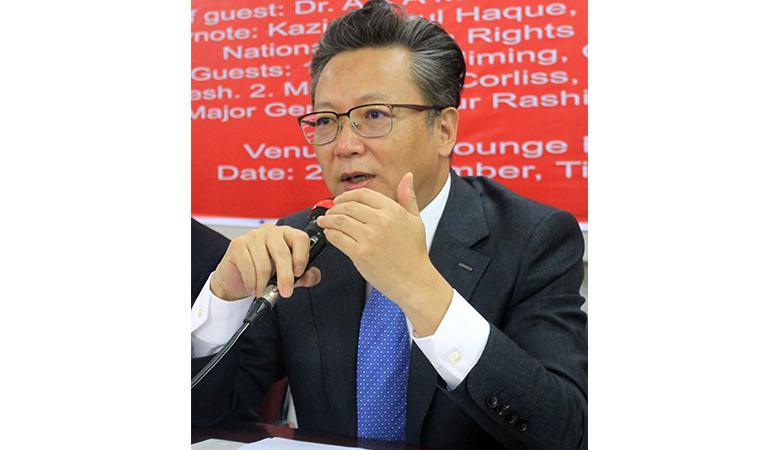Finding way to peaceful repatriation of Rohingyas

Speech by Ambassador
Li Jiming
This is an occasion that I have been looking forward to for quite a few days. As a trustworthy friend and partner of both Bangladesh and Myanmar, China plays a unique role in finding a sustainable solution to the Rohingya issue. To put it in one sentence, on the Rohingya issue, China cares, China contributes, and China acts.
Yes, China cares. There is no doubt that China shares Bangladesh’s concerns over the Rohingya issue. During Hon’ble Prime Minister Sheikh Hasina’s visit to China in July this year, President Xi mentioned to her that China appreciates Bangladesh’s generosity to shelter the displaced people, and will support all concerned parties to handle the issue properly through friendly negotiation. China will not favour one side over the other. China is trying to persuade Myanmar all the time that the eventual solution to the Rohingya issue will be beneficial to both countries.
Back in November 2017, Chinese Foreign Minister Wang Yi visited Bangladesh and Myanmar to mediate between the two neighbours and came up with the suggestion of a three-phased solution, namely “cessation of violence, repatriation, and development”, which serves as an important road map for the peaceful repatriation process of Rohingyas. In June and September 2018 and in September this year, Sate Councilor and Foreign Minister Wang Yi chaired three rounds of informal meetings among China, Bangladesh and Myanmar, charting the course of action more clearly each time than before.
Ambassador Sun Guoxiang, Special Envoy for Asian Affairs of the Chinese Foreign Ministry has been doing “shuttle diplomacy” between Bangladesh and Myanmar. During the past two years, Ambassador Sun has visited two countries a dozen of times, conveying messages, bridging gaps and building consensuses among different stakeholders, in the hope of finding a way out for the Rohingya crisis and the Rakhine State issue at large.
And China contributes. China has been contributing to solving the Rohingya issue in many ways. On September 27 and 28 2017, one month right after the violent incident in Rakhine State that triggered the huge influx of Rohingyas into Bangladesh, two Chinese cargo flights carrying 2000 emergency tents and 3000 blankets arrived at Chattogram International Airport in support of Bangladesh to accommodate the temporarily displaced Roghingyas.
During Prime Minister Sheikh Hasina’s visit to China in July this year, China and Bangladesh signed an agreement based on which China provided 2500 metric tonnes of rice to help the Rohingyas. Here I would like to inform you that the first batch of the rice started their journey to Bangladesh from Shanghai on November 8th, and is estimated to arrive in Chattogram on December 3rd. China’s assistance in this regard may not seem to be much in monetary terms compared with other donors’, but what we provided is tangible stuff solely meant for the Rohingyas with defined purposes, leaving no space for other institutions, NGOs or individuals to make profit from it.
The most important, China acts. China has been keen to conduct various activities to push forward repatriation. During the third informal meeting between the three countries in New York this September, three important consensuses were reached on the Rohingya issue. First, it is the political will and consensus of the three sides that repatriation must be started as early as possible. Second, a Joint Working Mechanism will be established to delve into the technical issues of repatriation under the political guidance of three Ministers. Third, promoting development is the fundamental solution, and border cooperation between China, Bangladesh and Myanmar should be strengthened to create an environment conducive to stability and development in the area. State Councilor and Foreign Minister Wang Yi also announced that China would deploy a medical team and encourage charity organizations to Cox’s Bazar to help the people in need.
To implement the consensuses, Myanmar Ambassador to Bangladesh, DG of Myanmar Wing ofMOFA and I myself have been staying in touch with each other over the past two months. Through frank and detailed conversation, we have found a lot of common grounds including a) The 3450 Rohingyas who have been verified by Bangladesh and Myanmar, the Hindu Rohingyas and those living along the “zero-line” are prioritized groups for early repatriation; b) Myanmar has agreed to engage more with the displaced people to build trust by talking face-to-face with them and to change the wording on NVC to erase misunderstanding and c) Bangladesh has agreed to allocate more resources and manpower to Cox’s Bazar and to adopt a more pragmatic approach to repatriation.
Another issue that we have been working on recently is to send a medical team to Cox’s Bazar. After thorough field investigation, we found that while the public health situation in the camps was as dire as it had been described by various sources, the health care services host communities could access had also been stretched to an alarming extent due to the prolonged stay of the displaced people. The medical team will focus on the host community as well as the Rohingyas. Yesterday the team already set off to Cox’s Bazar, while in Dhaka we are waiting for the completion of necessary government procedures for the team to be fully functional.
I arrived in Bangladesh in late August this year and the Rohingya issue has become one of the priorities of my work during my not-too-long stay here. From September 15th to 17th, I went to Cox’s Bazar and visited the camps in Ukhia and Teknaf and one located on the “zero-line” of Bangladesh and Myanmar border. I went into many small huts and talked randomly to the Rohingyas and asked whether they would like to go back.
Many of them gave me positive feedback, which made me more confident that one day, through the concerted efforts of all concerned parties, we will make repatriation happen. After the trip, in order to cope with the so-called “trust deficit”, I came up with the idea of a “1+1+2” project, i.e. each Rohingya household would select one representative as potential returnee, and China would hand out two mobile phones, one to the representative and one to the family members remaining in Cox’s Bazar.
The representatives will serve as volunteers and trail blazers to go back to Myanmar to see with their own eyes whether the condition is good enough and at the same time, share real-time information with their family members for them to decide whether to follow up. The security of the volunteers will be guaranteed by the Government of Myanmar.
To sum up, in the 1970s and 1990s, the same crisis happened to Bangladesh and Myanmar and the two countries were able to resolve it through bilateral approaches. This time, the crisis reached an unprecedented scale and gained much wider international coverage. On the one hand, more attention from the international community has helped Bangladesh to cope with this crisis. On the other hand, some actors with hidden purposes are trying to make the muddy water even muddier. This is part of the reason why repatriation hasn’t started yet.
China always believes that the issue should be treated as a bilateral one, with the two countries directly concerned playing the major role. Other countries in the world, including China, should help in a conductive manner. Here, I have three pieces of advice to the international community. One is to give more focus to the host community in Cox’s Bazar as they are also suffering. Two is to strengthen traceability of international donation to make sure that the money is used on Bangladesh and the Rohingyas. Three is to create conditions for Bangladesh and Myanmar to have friendly and peaceful dialogues.
Due to unreasonably high expectations, and maneuvres done by players with ulterior motives, China’s role has been, to some extent, exaggerated and misinterpreted. It is a well-accepted idea in many countries that China has a huge influence over Myanmar. Whatever we say, Myanmar will listen and do accordingly.
This idea easily results in the belief that China is always on the side of Myanmar for economic interests and won’t really help Bangladesh. Here I want to make it very clear that, Myanmar is a sovereign country as Bangladesh is. China has no right to lecture Myanmar about what to do. All the diplomatic activities of China are done following the principle of equality and mutual respect. What I and my colleague in Yangon Ambassador Chen Hai have been doing is to convey messages and to make suggestions. We have never forced the two sides to do anything that they do not want to. As a friend in the middle of two neighbours who are troubled by one certain issue, China knows where the boundary of mediation lies and who the major players are.
Speech by Steven Corliss
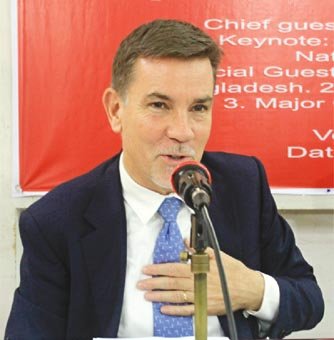
United Nations High Commissioner for Refugees (UNHCR) representative Steven Corliss said, “We have seen the Rohingyas fleeing from violence, oppression and the deprivation of basic human rights to Bangladesh for more than forty years now. Each time the Rohingyas returned home – without any real resolution of the problems they faced – they were uprooted again within less than a generation and forced across the border.”
“We must commit to ensuring that this is the last time the Rohingyas are compelled to seek refuge in Bangladesh. UNHCR has been very encouraged by the emphasis that the Foreign Minister AKA Momen– and indeed Prime Minister Sheikh Hasina herself – have placed on addressing the root causes that have made it impossible for the Rohingyas to live peacefully in Myanmar,” he added.
Referring to a (UNHCR interviewed) survey he said that about 97 per cent of the Rohingyas wanted to go back to their home (in Myanmar) when conditions allow. Given everything that the Rohingya people have experienced their resilience and commitment to returning and rebuilding their lives in Myanmar is remarkable. He continued, “My greatest motivation to work, with all my energy, toward peaceful, safe, dignified and voluntary repatriation comes from the fact that this is what the Rohingyas refugees tell us they want.”
About their peaceful repatriation, the UNHCR representative said, “The Rohingyas are not unrealistic. They are not asking for the impossible. They are seeking the assurances anyone would want to have before taking their life in their hands – and the lives of their children – and returning to a place where they experienced immense hardship and trauma. And still, I have to say this again, the Rohingyas want to go home to Myanmar”.
About the Rohingyas future he finally said, “Fifty-five percent of the Rohingyas are children. When these children would return home and grow into adults, they will be your future neighbours. We want them always to remember the generosity of the Bangladeshi people and the refuge that this country gave them when they needed it most.”
Speech by Kazi Reazul Hoque

In the keynote presentation at the seminar, former Chairman of National Human Rights Commission Kazi Reazul Hoque said, “The Rohingyas are facing legal and social discrimination for decades. Rohingyas who are now identified as ‘stateless entities’ started to take refuge in Bangladesh since 1978, with large arrivals in 1991-92, 2012, 2014 and 2016.”
“Bangladesh showed its generosity by opening its door and since then, as of today, there are 1.2 million Rohingyas. The government led by Prime Minister Sheikh Hasina gave them shelter with other necessities on humanitarian ground,” he added.
He said the UN fact-finding Mission on Myanmar in August 2018 concluded that Myanmar’s military in 2016 had carried out mass killings and gang rapes of Muslim Rohingyas with ‘genocidal intent’. The Mission named six Myanmar generals, including the commander-in-chief of army, and mentioned that they should be prosecuted for committing crimes against humanity. He also said that the international communities like UN special envoy on human rights in Myanmar, termed it ‘the hallmarks of genocide’.
“The International Criminal Court on 2018 stated that the alleged deportations of Rohingyas are a crime against humanity. West African country Gambia brought a genocide case against Myanmar on November 11 last in the International Court of Justice (ICJ) urging the United Nations to order measures to immediately stop atrocities and genocide against its people”, he said. The IOJ based in Hague would hold public hearing in December next, he said.
Speech by Major General (retd) Abdur Rashid
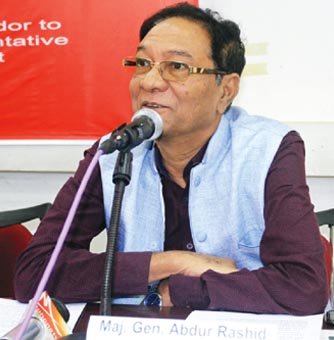
Maj Gen Abdur Rashid said sustainable repatriation of Rohingyas can only be ensured through establishing accountability for the crimes against humanity committed by the Myanmar army on the minority Muslim community. “The perpetrators of genocide on Rohingya people must be brought to book, otherwise, no matter how many times they are repatriated, they would be victims of crimes against humanity,” he added.
He also said, “So, for the peaceful repatriation of Rohingyas, international community should ensure accountability first, otherwise, it will be repetition of the same offences. “Quick and safe repatriation of Rohingya refugees can only be a solution. We want a peaceful solution to this end. And Bangladesh is committed to repatriate the Rohingyas in a peaceful manner,” he said, adding that some NGO’s are trying to do their work which makes the initiative of repatriation process failed.
He said many dialogues regarding the Rohingya issue have taken place at home and abroad but no fruitful outcome has come yet. “Minority community in every country across the globe is being repressed and humiliated in many ways. So that the majority communities will have to take the responsibilities on their shoulders,” Rashid said.
He said Myanmar must create congenial atmosphere for sustainable repatriation of Rohingyas, so that they get freedom of movement after returning to their home. “Myanmar will have to issue citizenship to the Rohingyas to uphold their dignity. Besides, they will be to be ensured freedom movement and security of lives,” the expert demanded.
“If the fundamental rights of Rohingyas are not ensured, no dialogue can bring forth any fruitful outcome,” he said, adding Bangladesh is bearing the brunt of the problem from the very beginning. And we wanted to solve the problem in a diplomatic way. Observing that if diplomacy fails, war begins, the retired army person said, “Myanmar crossed the Bangladeshi Air several times, but Bangladesh did not throw a single bullet in face of the instigation.”
This proves that, he continued, Bangladesh do not want war. Bangladesh is fully committed to have a peaceful repatriation.
He lamented that Myanmar takes part in many dialogues, but we see that their dialogue is nothing but spending of time. He said Bangladesh is also spending huge amount of money for Rohingyas. If Bangladesh failed to repatriates Rohingya, it would make whole region unstable, he warned.
Speech by Sharif Shahab Uddin
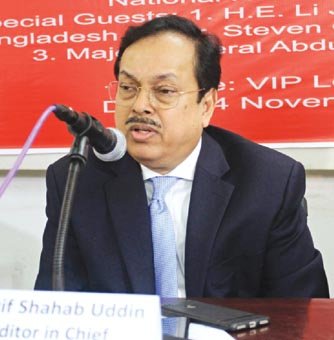
Bangladesh Post Editor Sharif Shahab Uddin said the Rohingya crisis is an environmental, political and social threat to Bangladesh. The crisis is now becoming a regional threat. “The international community must address the situation and raise their voice for peaceful repatriation of Rohingyas. This is why we, the journalists’ community, are very much concerned about it and have come forward,” he added.
He said what Rohingyas faced in Rakhine is genocide. So, before repatriation, Myanmar must guarantee security and safety of the Rohingyas by deploying civilian monitors from international community in the Rakhine state, besides bringing the perpetrators of the genocide to justice.
Myanmar must build trust among Rohingyas by discarding discriminatory laws and practices through granting citizenship to the minority Muslim community which they enjoyed earlier.

A view of the audience at the seminar.
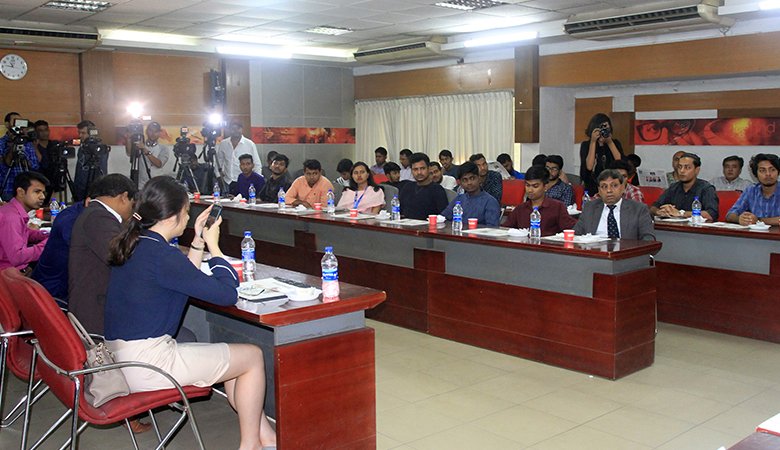 Distinguished guests and journalists at the seminar.
Distinguished guests and journalists at the seminar.



